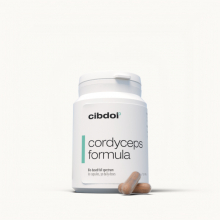What does cordyceps do for the heart?
Last updated:
Published:
Ever wondered about the power of medicinal mushrooms? Well, cordyceps is a game-changer. This unique fungus, which includes species like cordyceps sinensis and cordyceps militaris, has properties that make it a big deal in the health world.
Contents:
But it's not just about popping a mushroom capsule for general wellness. We're talking heart health here! Research shows there's a significant link between this plant and cardiovascular wellbeing. Understanding how cordyceps can influence heart health could be key in managing diseases like kidney disease. So let's cut to the chase and explore what these authors have uncovered about the production pathway of this potent fungus!

Role of Cordyceps in Blood Pressure Regulation
Ever wondered how cordyceps can play a role in blood pressure regulation? Let's dive right into it.
Lowering High Blood Pressure
The first thing to know is that cordyceps has shown potential to help lower high blood pressure. Picture this: you're sipping your morning coffee, the caffeine coursing through your veins, causing a spike in blood pressure. But here's where cordyceps steps in. It acts like an adrenergic receptor antagonist, counteracting the effects of caffeine and other substances that raise blood pressure levels.
Research shows that cordyceps can reduce both systolic and diastolic blood pressure by relaxing the smooth muscles inside our arteries and improving blood flow. Kinda like taking the foot off the gas pedal and letting your car coast down a hill - it's all about control.
Maintaining Healthy Blood Pressure Levels
Not only does cordyceps help lower high blood pressure, but it also contributes to maintaining healthy levels. Think of it as a thermostat for your body – regulating and balancing out extremes.
It achieves this by influencing several factors:
-
Blood Sugar Levels: Cordyceps helps regulate blood sugar levels, which is crucial because high sugar levels can damage arteries over time.
-
Kidney Function: This fungus promotes healthy kidney function which plays a key role in controlling overall blood pressure.
-
Stress Management: Stress can cause temporary spikes in blood pressure, but with its adaptogenic properties, cordyceps helps manage stress better.
Mechanism Behind Cordyceps' Influence
Now let's get into how exactly this works. The main mechanism behind cordyceps' influence on blood pressure regulation involves enhancing nitric oxide production while inhibiting ACE (Angiotensin-Converting Enzyme). Nitric oxide relaxes our arteries promoting better blood flow while ACE inhibition prevents constriction of these vessels - quite clever!
In addition to this primary action, some other benefits include improved brain function and sexual function, thanks to increased oxygenation from better circulation.
So next time you're feeling stressed or noticing an unwanted rise in your heart rate after downing that double espresso shot; remember there's a natural solution available – Cordyceps! You might just find it becomes your new secret weapon for keeping those pesky pressures at bay.
Impact of Cordyceps on Cholesterol Levels
Cordyceps, a type of fungus known for its medicinal properties, could be a game-changer in the world of cholesterol management. Why? Let's delve into the details.
Potential LDL Reduction
First off, cordyceps might play a role in lowering bad cholesterol levels. LDL cholesterol, often referred to as 'bad cholesterol,' can lead to hyperlipidemia if left unchecked. This condition is characterized by excessively high levels of fats (or lipids) in your blood and poses serious risks to heart health.
Now here's the interesting part: studies suggest that cordyceps may help reduce LDL cholesterol levels. Imagine this - you're trying to balance on a seesaw but it's leaning heavily on one side. That's what having high LDL is like; it throws your body out of balance and puts pressure on your heart. Cordyceps acts like a friend who sits on the other end of the seesaw, helping restore balance by potentially reducing those pesky LDL levels.
HDL Level Boost
But that's not all folks! Cordyceps may also boost HDL or 'good' cholesterol levels. It’s like having an extra layer of protection for your heart. Higher HDL levels mean less bad cholesterol floating around in your bloodstream because HDL helps carry it back to your liver where it can be broken down.
Think about it like this – if LDL is like clutter piling up in your house (your body), then HDL is like an efficient cleaning service that tidies up and takes out the trash (LDL). So, with cordyceps possibly increasing these hardworking HDL cleaners, things start looking brighter for our hearts!
Heart Health Impact
So why does all this matter? Well, when you combine potential reductions in bad cholesterol with possible increases in good cholesterol, you get quite an impressive impact on overall heart health!
Let's put it into perspective:
Less Bad Cholesterol (LDL): With lower LDL levels comes reduced risk of plaque buildup in arteries which means less chance for heart diseases.
More Good Cholesterol (HDL): Increased HDL helps clear away any bad cholesterol hanging out too long in your bloodstream.
Together these changes could promote healthier lipid profiles and ultimately better heart health! It’s kind of like giving your heart a makeover from inside out!
To sum up: While more research is needed to fully understand just how much cordyceps can do for our hearts, current studies indicate its potential for managing total cholesterol level effectively - making it worth considering as part of our daily regimen.
What does cordyceps do for the heart?
Cordyceps, a type of fungus, has shown significant potential in promoting heart health. Its role in blood pressure regulation is noteworthy. It aids in maintaining optimal blood pressure levels, reducing the risk of hypertension and related cardiovascular conditions.
In terms of cholesterol management, cordyceps has proven beneficial. It helps lower bad (LDL) cholesterol levels while boosting good (HDL) cholesterol. This balance contributes to overall heart wellness, preventing diseases like atherosclerosis.
Remember, your heart health matters! Incorporating cordyceps into your routine might be worth considering. However, it's crucial to consult with healthcare providers before starting any new supplement regimen.
FAQS
Q1: How does cordyceps help regulate blood pressure?
Cordyceps contains certain compounds that help relax the blood vessels and improve circulation, thus helping maintain healthy blood pressure levels.
Q2: Can cordyceps lower my cholesterol?
Yes, studies have shown that cordyceps can help decrease LDL (bad) cholesterol levels while increasing HDL (good) cholesterol.
Q3: Is it safe to take cordyceps daily for heart health?
While generally safe for most people, it's always best to consult with a healthcare provider before starting any new supplement regimen.
Q4: Are there any side effects of taking cordyceps?
Some people may experience mild side effects such as stomach upset or dry mouth. If you notice any adverse reactions, stop use and consult with a healthcare professional immediately.
Q5: Where can I buy high-quality cordyceps supplements?
You can find quality cordyceps supplements at reputable online retailers like Cibdol. Always opt for brands that are transparent about their sourcing and processing methods.










